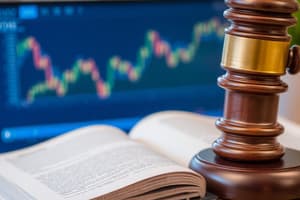Podcast
Questions and Answers
What is the primary purpose of copyright law?
What is the primary purpose of copyright law?
- To restrict access to creative works
- To ensure free distribution of all creative materials
- To limit the creativity of artists
- To protect the rights of creators over their works (correct)
Which of the following is an example of fair use?
Which of the following is an example of fair use?
- Quoting a passage from a book in a review (correct)
- Copying a movie in its entirety and selling it as your own
- Using a song in a commercial without permission
- Creating merchandise based on a famous painting without consent
What characterizes works that are in the public domain?
What characterizes works that are in the public domain?
- They are always under exclusive ownership
- They can never be used by anyone
- They can be freely used without permission (correct)
- They are protected by copyright law
Which legal concept allows limited use of copyrighted material without permission?
Which legal concept allows limited use of copyrighted material without permission?
Why is it important to understand public domain works thoroughly?
Why is it important to understand public domain works thoroughly?
In what circumstances does fair use typically apply?
In what circumstances does fair use typically apply?
What distinguishes Creative Commons licenses from traditional copyright licenses?
What distinguishes Creative Commons licenses from traditional copyright licenses?
'Fair Use' is intended to strike a balance between what?
'Fair Use' is intended to strike a balance between what?
Which statement best describes works that fall under 'Public Domain'?
Which statement best describes works that fall under 'Public Domain'?
What is one advantage of 'Creative Commons' licenses compared to traditional copyright protection?
What is one advantage of 'Creative Commons' licenses compared to traditional copyright protection?
Flashcards are hidden until you start studying
Study Notes
Copyright Law, Fair Use, Public Domain, and Creative Commons
Copyright Law
Copyright law is a legal framework that protects original works of creators, ensuring that they have control over the use, reproduction, and distribution of their creations. Copyrightable works include various forms of creative expression, such as literature, music, movies, photographs, artwork, and programming code.
Fair Use
Section 107 of the U.S. Copyright Act allows for limited use of copyrighted material without permission from the copyright owner. Known as "fair use," this doctrine aims to balance the public's interest in using copyrighted material with the need to protect the rights of copyright holders. Examples of fair use include commentary, criticism, news reporting, teaching, scholarship, or research.
Public Domain
The concept of public domain refers to works that are not protected by copyright law due to expiration of copyright or because they never had copyright protection in the first place. Works entering the public domain can be freely used, adapted, and distributed by anyone without seeking permission from the copyright owner. However, determining whether a work falls within public domain requires careful consideration due to complexities surrounding copyright terms, extensions, and other factors.
Creative Commons
Creative Commons is a nonprofit organization that offers free, standardized, machine-readable, and simple-to-understand licenses for creators who want to share their work while still maintaining certain rights and protections. The licenses range from permitting unrestricted use to allowing specific permissions like non-commercial use, adaptations, and derivative works. Creative Commons licenses aim to promote open access, collaboration, and innovation while respecting the rights and interests of creators. They provide a middle ground between total protection given by copyright and complete freedom offered in the public domain.
Studying That Suits You
Use AI to generate personalized quizzes and flashcards to suit your learning preferences.




